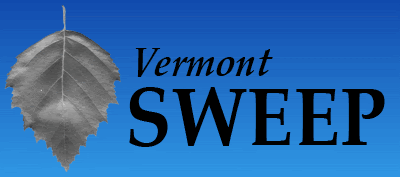
Table of Contents
From the Board
SWEEPing News!
Professional Development & Opportunities from NAAEE
Vermont Authors Share Their Talents
|
From the Board
Letter from the Chair
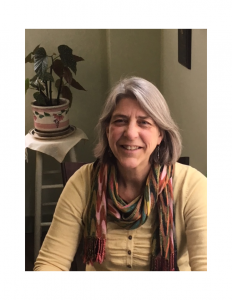
It’s been a stiff winter. Bitter cold and deep snow, a bad flu season, and so many snow days that some kids won’t start their summer vacation until late June. Another storm is scheduled to hit tonight, which should challenge our morning commutes. But the days of hats and gloves are numbered and, if we can just get through mud season, we can look forward to another glorious awakening of the earth come spring!
On May 1st, we will revel in the season of bud burst and birdsong by convening at the
Birds of Vermont Museum in Huntington for our
Spring Gathering. During this meeting, our membership will vote on board members and officers. We’ll also describe the mini-grants that SWEEP will award this year, with proceeds from the NEEEA conference this past fall. Please see the “Save the Date” postcard for this gathering in this
newsletter.cerickson14@hotmail.comSpeaking of the NEEEA conference, our board is catching its breath after a harried year and a half of planning, organizing, and executing this regional conference at the Lake Morey Resort. SWEEP’s conference chair, Lauren Chicote, did a stellar job of holding the vision for this event while managing the myriad details that made it a reality. I can’t praise her enough for her exceptional efforts. Please see her recap of the conference in this newsletter.
Now that the NEEEA conference is behind us, we will look ahead to SWEEP’s next chapter of work. Please consider what SWEEP means to you, and ponder its unrealized potential, because we will seek input from our membership as we design our future.
Well, he finally did it. Rob Anderegg made good on his long-standing threat to leave the SWEEP Board. We would like to send Rob a giant hug for his skilled and witty service to the SWEEP community, and wish him well in his retirement from Four Winds Nature Institute. Other folks have stepped up to offer their talents to our board. We were pleased when Rebecca Roy, the Conservation Education Coordinator at the Vermont Department of Forests, Parks, and Recreation, filled a mid-term vacancy. Chris Runcie, an inspiring and experienced environmental educator, was voted in last spring, as was Elizabeth Spinney, Invasive Plant Coordinator with Vermont FPR.
I am proud of the individual efforts of our board members as well as the spirit of joyous collaboration that is evident when we gather for SWEEP business. Our Nominating Committee is looking for new folks to join us. If you would like to be nominated for our board or know someone whom you would like to suggest, please see the note on nominations in this newsletter.
And finally, thank you for the work you do to connect Vermonters in meaningful ways to our lovely and vibrant natural environment. We are all better off because of your efforts.
Warm Regards,
Jenna Guarino
SWEEP Board Chair (and interim Treasurer)
SWEEP Membership Renewals
SWEEP members are students and interns, individuals and organizations. Together, we make SWEEP possible. Please renew your membership for 2019, or join if you are not currently a member. Our membership rates and benefits are as follows.
Students /Interns ($15) & Individual Members ($20)
*Free admission to membership events
*Discount on registration to any SWEEP-sponsored conferences
*Listed in our SWEEP on-line directory
*SWEEP e-newsletter twice a year
Organizational Members ($50) Organizational members get all of the above plus
*A link from the SWEEP website to the organization’s website.
*Full benefits of membership (above) for three staff members. This includes the organization’s SWEEP contact plus two additional staff members. Memberships for additional staff members (beyond three) are $10 each.
We have worked hard to keep our membership rates low over the years to make it possible for all environmental educators to join our community. Please go to the
Vermont SWEEP Membership Formto register and pay online, or email Jenna Guarino, SWEEP Treasurer, at
jguarino556@gmail.com if you prefer to send your registration and payment through the mail. Also contact Jenna if you have questions. Please help our volunteer board better serve Vermont’s EE community with your financial support!
SWEEPING NEWS!
SWEEP Spring Membership Gathering
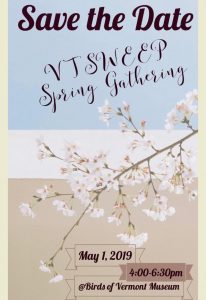
Please join us for our spring gathering to get reacquainted with your colleagues from around the state, learn about programming at the Birds of Vermont Museum, participate in SWEEP’s annual business meeting, and vote on the members of our Board of Directors. (Please note: We’re seeking nominations for the board – please see the Nominating Committee’s message in this newsletter.) Please bring a food or drink donation for our potluck dinner.
At this gathering, we’ll have our first SWEEP Swap! Do you have extra sampling nets in the back of your closet? Is there an unused pile of field guides sitting in the corner? Is your craft bin overflowing and causing office mates to stare? If so, bring these extra items to the SWEEP spring gathering and we can have a swap. No money will change hands. Get those unused items into the hands of folks who will get them back into circulation!
_______________________________________________________________________________________
SWEEP Mini-Grants Now Available! APPLY TODAY
VT SWEEP is pleased to announce Mini-Grant Applications for 2019. These grants can be used to launch projects that advance environmental education for the State of Vermont. The mini-grant awards can range from $250-$600. Vermont schools, nonprofits, and members of SWEEP are eligible to apply for funds.
_______________________________________________________________________________________
Want to Get Involved? SWEEP is looking for Board Nominations.
VT SWEEP is recruiting Directors for our Board. Through our quarterly board meetings, we plan for membership events, find grants to help our colleagues, produce seasonal newsletters, and serve as a connection to the greater New England EE community. Your service as part of our board directly helps our mission to promote a sustainable future through state and regional networks. Now, more than ever, the environmental education community needs to come together, share best practices and help each other achieve our goals.
Wait! You say you want to be on the board, AND serve as an officer? Well, you’re in luck, because we are also accepting nominations for the full slate of officers.
Please consider joining the board (or nominating a friend or colleague), and become part of our growing network! If you would like to be nominated, or would like to nominate someone else, please contact Elizabeth Spinney at
elizabeth.e.mitchell@gmail.com.
_______________________________________________________________________________________
Coming Together – A Recap of the 2018 NEEEA Conference
By Lauren Chicote, VTSWEEP Board Member and Conference Planning Co-Chair
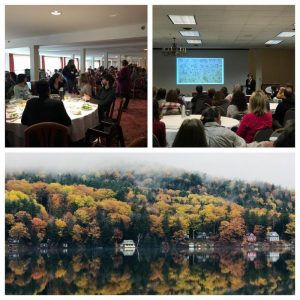
VT SWEEP, in partnership with New Hampshire Environmental Educators (NHEE) and The Wellborn Hub, hosted the New England Environmental Education Alliance’s (NEEEA) Annual Conference this past November at the Lake Morey Resort in Fairlee, Vermont. While the weather was slightly dismal with rain and dense fog, the atmosphere at the conference was anything but dismal or foggy! With over 250 attendees from across all six affiliate states, the three-day event was filled with positive energy and connections. Everything about the conference exemplified the theme of Coming Together to Share Our Collective Work of Building Environmentally Resilient and Just Communities.
We kicked things off with the Wellborn Hub Leadership Conference on the first day, which helped set the tone for the rest of the conference. Cheryl Charles, founding Executive Director of the Nature Based Leadership Institute at Antioch University New England and the Co-Founder, President and CEO Emerita of the Children & Nature Network, gave an inspiring keynote speech, ‘Ecology of Hope’. The rest of the day was filled great discussions, networking, and learning for all.
Over the next two days, you could feel the energy and excitement build as new connections were made, old friends were reunited, and everyone shared the collective learning and inspiration that were sparked by the many workshops and presentations. Marianne Krasny, Director of the Civic Ecology Lab at Cornell University, gave an exciting keynote on Urban Environmental Education and the work of the Civic Ecology Lab. We were thrilled to have Judy Braus, Executive Director of the North American Association for Environmental Education (NAAEE), give a lively, witty, and upbeat second keynote address at dinner. I was inspired by both of these speakers, and by the conversations and excitement they ignited throughout the rest of the conference.
At every NEEEA conference, awards are given to honor outstanding environmental educators and programs from the New England region in three categories: Non-formal Environmental Educator, Formal Environmental Educator, and Maria Pirie Environmental Education Program Award. Edmund Smith from Two Rivers Magnet Middle School in East Hartford, Connecticut, and Tara Jo Holmberg, a professor at Northwestern Connecticut Community College, were awarded the Formal Educator Award. The award for Non-formal Educator was presented to Dr. Laurence “Larry” Davis, Director of Nature Programs and Teaching at Camp Pemigewassett (“Pemi”) in Wentworth, New Hampshire. The Maria Pirie Environmental Education Program Award was given to two very different, but equally outstanding, organizations for their passion and dedication to engaging youth in environmental education: Amoskeag Fishways of Manchester, New Hampshire, and Environmental Living and Learning for Maine Students (ELLMS) Collaborative of Maine.
A Lifetime Achievement Award was also awarded at this year’s conference to honor Coleen O’Connell. Coleen has dedicated her life to environmental education and inspires others to lead the charge. She recently retired from Lesley University, where she taught for over 20 years. She is currently on the VT SWEEP Board and the NEEEA Board as the Vermont representative. We are fortunate to have Coleen’s participation in VT SWEEP, where she continues to dedicate herself to advancing the field of environmental education and serving as an excellent role model to many.
The Coming Together theme played out over the whole process of putting this conference together, and celebrated the collaborative efforts of the partnership for planning the conference. I had the pleasure of getting to know and working with some amazing educators and leaders in the environmental education field in our region. As we move forward, I hope the collaborative spirit that was sparked at the conference continues and flourishes as we progress into the future together.

_______________________________________________________________________________________
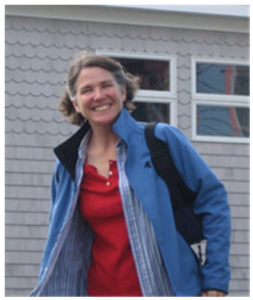
By Barry King and Lisa Purcell
Editor’s note: For almost 2 years, SWEEP has focused on planning and executing the 2018 NEEEA Conference. With a successful conference behind us, we will spend time in 2019 reflecting on our past and our present to chart a path into our future. To that end, two veteran SWEEP leaders, Barry King and Lisa Purcell, have offered us the following history. We invite you, our members, to join the conversation about SWEEP’s next chapter.
It has always been about connecting, sharing information and supporting each other. In 1973, when SWEEP started, the handful of environmental educators and programs in Vermont were dispersed throughout the state and didn’t really know what each other was doing. Sally Laughlin of VINS (Vermont Institute of Natural Science) and Ty Minton at the Putney School spearheaded a gathering of people that included Tom Hudspeth of The University of Vermont, Abbott Fenn of Keewaydin, Duncan Campbell of Merck Forest, Jean Davies of Camp Betsy Cox, and Doug Sherry of the Montpelier Environmental Education Program. SWEEP was formed at that first meeting. Sharing and camaraderie was SWEEP’s sole purpose for years and, back then, physically gathering and talking was the only way to connect as a group. We’d take a quick tour of the host site, then spend the next hour or so updating the others on our work. When someone needed information about a topic or problem, others chimed in to help. Our programs were fairly small and most had a specific niche; there was no sense of competition. We were all feeling our way in the new field of environmental education and wanted each other to succeed. This collegiality fostered valuable growth of the individuals and programs and, eventually, of SWEEP itself.
After being loosely organized for about 15 years (organized enough, however, to host two NEEEA conferences!), in 1987 SWEEP’s members decided to write by-laws, establish memberships, charge dues, start a newsletter, and print a directory of members/programs for teachers. Over the next decade, in addition to meetings, newsletters and the NEEEA conference rotation, SWEEP held multiple Vermont conferences including The Governor’s Conference on Environmental Education, plus many topic-specific salons and retreats. In 1998, SWEEP decided to take on a bigger project: convincing the VT State Board of Education to add two standards to Vermont’s Framework of Standards and Learning Opportunities. Through various partnerships, grants, statewide outreach and two years of effort, the two new standards, “Sustainability” and “Understanding Place,” were approved. An additional standard, “Natural Resources and Agriculture” followed in 2006.
In 2009, SWEEP embarked on another ambitious initiative, an 18-month project to create an Environmental Literacy Plan (ELP). With an appreciative inquiry focus, the planning process included community-based dialogues in each of Vermont’s 14 counties. The minutes and county highlights comprise the Vermont Roadmap to Environmental Literacy. Harnessing this energy, SWEEP partnered with Promise of Place for the 2010 NEEEA conference. Preliminary work then began on a K-12 ELP to support the Next Generation Science Standards, which Vermont adopted in 2013. The next year, SWEEP participated in a NEEEA capacity building project and received an EPA grant to increase environmental awareness and knowledge. Vermont’s sub-grants supported curriculum development, a succession of phenology field trips, and a statewide teacher professional development series.
In 2016, SWEEP organized and hosted the statewide Cultivating Climate Resilience Summit with funding secured by NEEEA from U.S. EPA. The Vermont State climatologist and UVM professor, Lesley-Ann Dupigny-Giroux, gave a lively keynote address about her climate research and her educational programs with students and teachers around the state. 2016 was also the year that SWEEP made the strategic decision to become a 50(c)3 organization, and in 2017 we revised our bylaws to provide clearer guidance for organizational operations.
In the fall of 2018, SWEEP, NHEE (New Hampshire Environmental Education), and the Wellborn Hub hosted the NEEEA Conference. The theme, “Coming Together”, reflected SWEEP’s commitment to bringing together environmental educators in a common vision of shared work – the same philosophy SWEEP has had since its beginning.
_______________________________________________________________________________________
Professional Development & Opportunities from NAAEE
Connecting People to Nature: From Caring to Conservation and More! – Webinar on March 21, 2019, 3:00 to 4:00 pm.
With Louise Chawla, University of Colorado; Lauren Watkins, Impact by Design; and Sheila Williams Ridge, University of Minnesota. Presented in partnership with the US Forest Service.
Drawdown Ecochallenge – a 21 day engagement program focused on carbon reduction.
From
drawdownecochallenge.org: The challenge takes place April 3-24 and follows actions highlighted in Drawdown, a book based on meticulous research that maps, measures, models, and describes solutions to global warming that already exists. Participants track and share their progress online in a robust platform and earn points for taking action. The combination of collective action, camaraderie, and friendly competition makes change a little easier – and a lot more fun.
Drawdown EcoChallenge provides tools and inspiration to turn intention into action, and gives participants a fun and social way to think about and act on proven solutions to reverse global warming. Over eighty actions within seven challenge categories provide participants with diverse options to reduce carbon usage.
Drawdown EcoChallenge is free and open to the public. Participants can join an existing team, create a new one, or join the Community team.
UL Innovative Education Award – A recognition award for an existing environmental education program; applications are due on midnight (Eastern Time) on March 12, 2019.
From the website
https://ulinnovationeducation.naaee.net/about: The UL Innovative Education Award is a first-of-its-kind initiative designed to invest up to US $250,000 annually in environmental and STEM education, sustainable communities, and youth empowerment. We offer recognition awards to increase the impact of existing innovative non-profit programs that use the Environment as a pathway to STEM Learning (E-STEM).
The award program, designed in collaboration with NAAEE, empowers the next generation of leaders to connect with the natural world, develop evidence-based sustainable solutions for local communities, and nurture a capacity for social responsibility.
We choose to recognize and support innovative programs that already make positive impacts in their communities. With the support of this award, these successful programs can scale up their efforts to reach more youth in their communities and share their innovations with other organizations, and develop new innovations. We believe this is an important contribution to the field, where there are few recognition awards for excellence in E-STEM.
_______________________________________________________________________________________
Vermont Authors Share Their Talents
Lynn Levine has done it again!
Lynn has produced another fine resource for environmental educators and naturalists in Vermont. Her latest book, Identifying Ferns the Easy Way, joins several previous books that she has written, and all are available through her website,
Heartwoodpress.com.
Praise for Identifying Ferns includes the following passage from Gordon Hayward, author and professional landscaper:
Here is a substantive, easy-to-use ID book on ferns of the Northeast written by a naturalist and teacher who has lived her life paying attention to our native New England woodlands. Levine worked with Briony Morrow-Cribbs, a highly accomplished artist and teacher who is also an experienced gardener. Both being teachers, they demystify the identification process by providing you with an approachable three-step process. Everyone who walks in the woods here in the Northeast will take great pleasure in this empowering guide. This is your way into understanding the mysteries of these native plants.
_______________________________________________________________________________________
Michael Caduto Receives Book Award
A book by fellow Vermont author Michael Caduto, Riparia’s River, just received a Reading is Fundamental (RIF) Multicultural Book Award. RIF created a website (
https://www.rif.org/literacy-central/book/riparias-river) with learning activities for children ages 7 to 10 years that supplement and enhance the text and illustrations in the book. The activities include a Word Search; Memory Match; Criss Cross; Guides for Educators, Parents and Families, and Community Coordinators; Extension Activities; and a Vocabulary Scaffold.
Riparia’s River is the story of how a group of curious kids work together to find out how their their favorite swimming hole became polluted. With the help of a mysterious naturalist named Riparia, they bring the river back to health.








